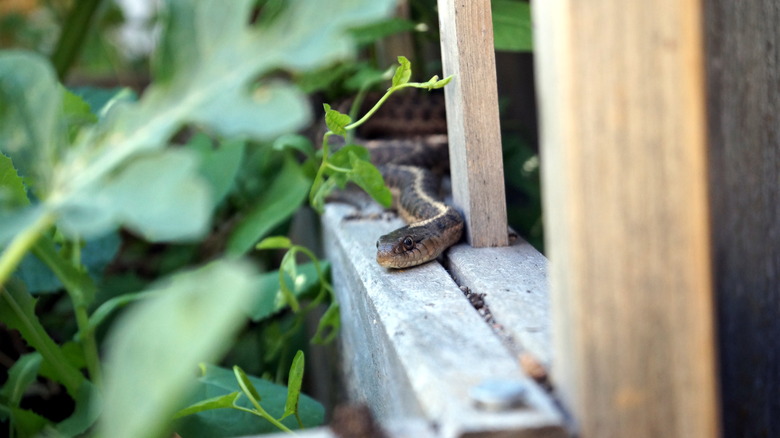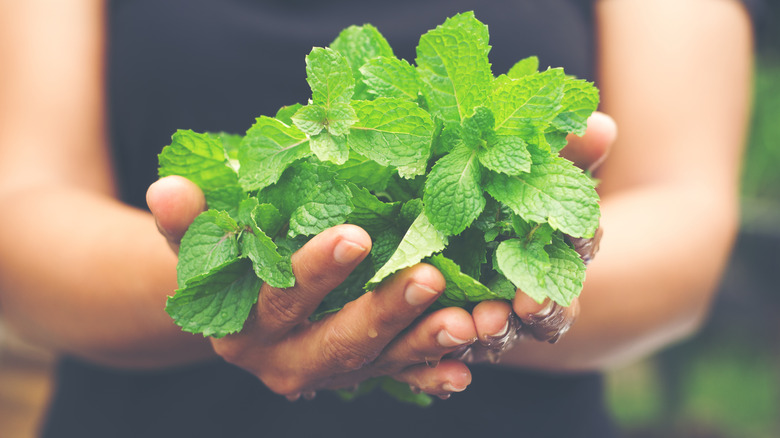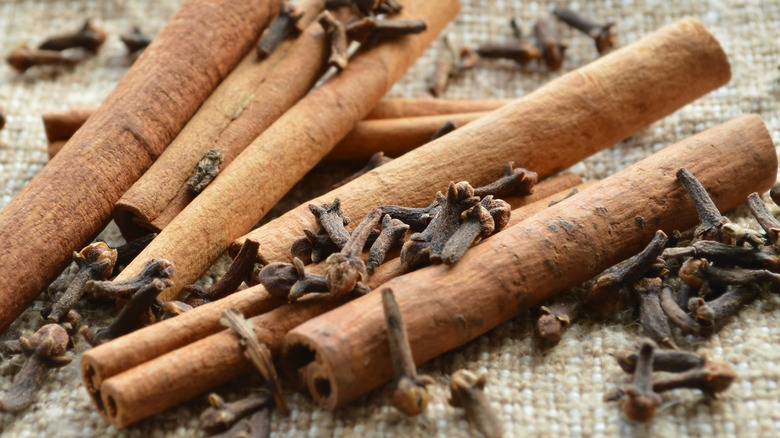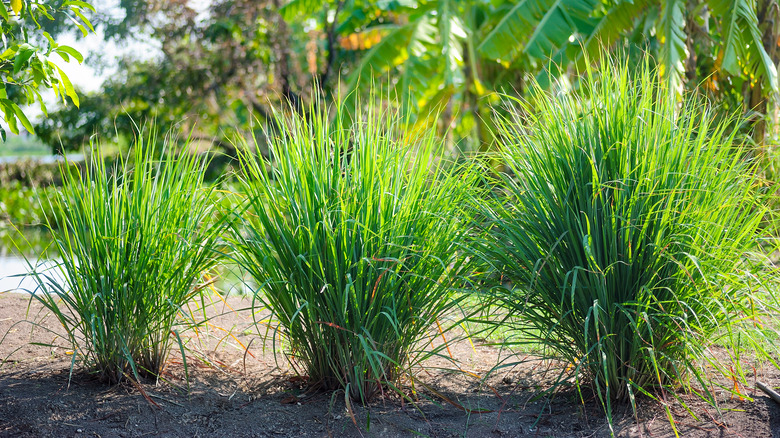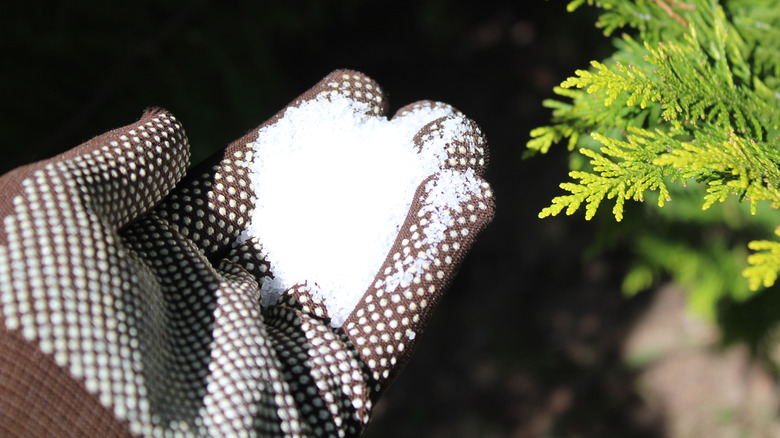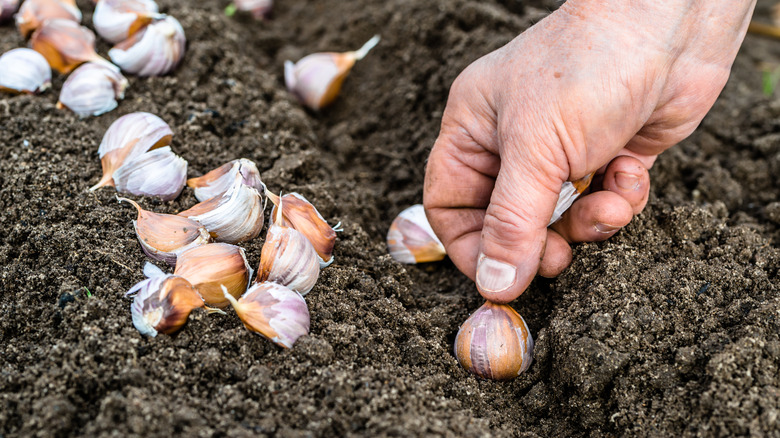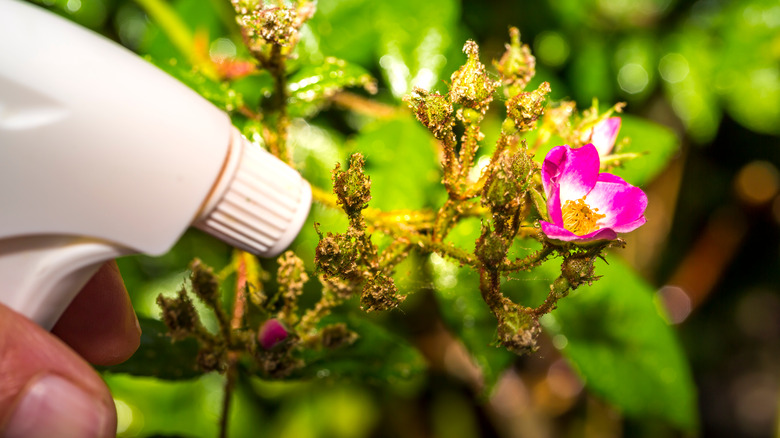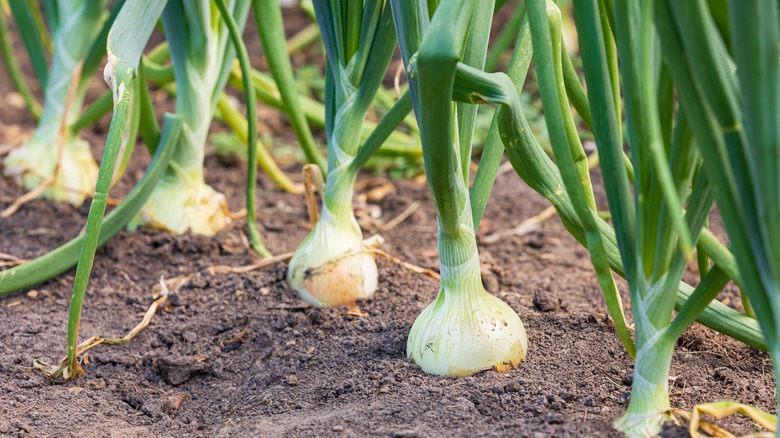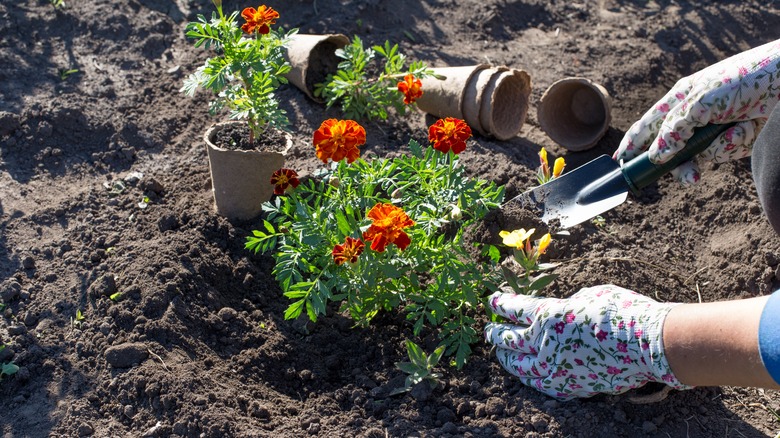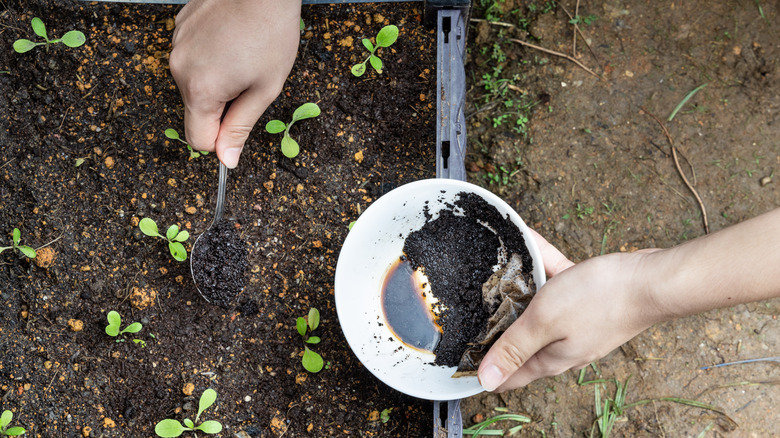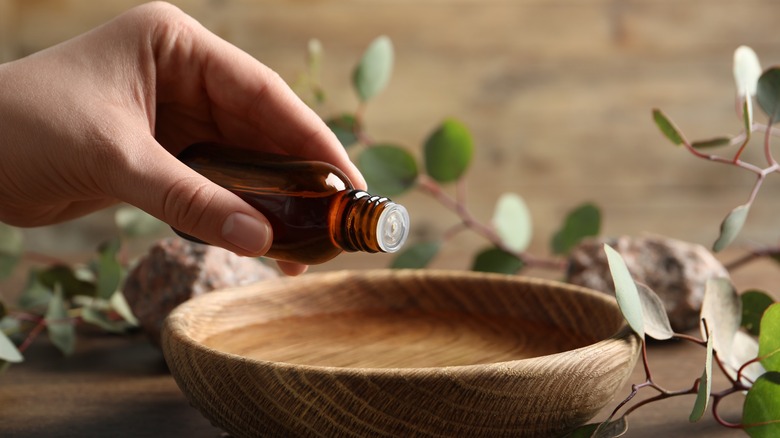Natural Ingredients You Should Be Using To Keep Snakes Out Of The Garden
Gardening should be a relaxing activity, and it's easy to imagine a lush, snake-free space. However, this feels impossible for anyone dealing with these uninvited guests. There are dozens of conventional ways to ward off snakes, but there are also equally effective natural routes. Start by unlocking the potential of everyday items around the house and using them as part of your garden's defense. From garlic's pungent smell to the acidity of coffee grounds, each offers a new way to deter snakes.
Scientific studies show certain textures and smells, which people often like, are uncomfortable or repulsive to a snake. Ingredients like crushed rock salt or eucalyptus create an environment snakes would rather avoid by tapping into their sensitivity to certain stimuli. This is vital because it takes your attention from chemical-laden products and refocuses it on scientifically supported and sustainable options. You'll get practical, eco-friendly solutions to help solve the problem of snakes in the garden, using items you have at home and an understanding of snake behavior.
Mint
To use mint to repel snakes, buy a few mint plants and plant them along the borders of your gardens or flower beds, ensuring you cover entry points or areas where snakes gather. Ensure your mint gets enough sunlight and water because healthy plants are more aromatic. If you can't have actual mint plants, scatter dried mint leaves all over your garden, focusing on any gaps or entry points. Scatter more mint leaves every few weeks to keep the scent strong. Another option is to create a mint spray. Get a pot of water and drop in dried or fresh mint leaves. Bring it to a rolling boil, leave it for 15 to 20 minutes, and let it cool. Take your mint-infused water, fill a spray bottle, and saturate any areas where you see snakes, along garden walls, or in hidden corners.
Vets claim that mint's strong scent is the main reason snakes avoid areas with it. Snakes use their sense of smell to find prey and move about, and mint's strong smell repels and confuses them. Mint also proliferates, and this thick growth habit creates a physical barrier that makes it hard for snakes to cross. Also, mint attracts cats, who are natural enemies of snakes. This predator's presence in your garden adds another layer of defense. Combining the scent of mint with its ability to change your garden's ecosystem to deter snakes is an eco-friendly and practical solution for snake prevention.
Cinnamon and clove oil mixture
Clove and cinnamon oils keep snakes and pests out of the yard and garden. Start by buying pure cinnamon and clove essential oils from a local store or online. Get a clean spray bottle and mix a cup of water with ¼ cup of cinnamon oil and ¼ cup of clove oil. Shake the bottle to blend the oils and water before spraying it. Concentrate on spraying around the garden's perimeter, paying close attention to dense foliage, rocks, or garden sheds where snakes like to hide. Reapply this mixture after each rain or a heavy watering session, as water will wash it away. Add two or three drops of dish soap to the mixture to make it stick better. Another method is to create the oil and water mixture, soak strips of cloth in it, and place them around the garden.
A 2023 study published in Toxicon points out that cloves and cinnamon oils work so well to deter snakes because they can disrupt the snake's senses. They're very sensitive to strong odors, and clove with cinnamon oil is overpowering. The key to this mixture's ability to overwhelm snakes is that it overloads their Jacobson's organ. Snakes use this specialized sensory receptor to sense pheromones and smells around them. The strong, spicy scent can disorient the snakes, and it's potent enough to cover environmental scents, making it challenging for snakes to hunt or move around the garden.
Lemongrass
To repel snakes, plant lemongrass along the edges of your garden. Lemongrass thrives when planted in sunny spots with well-draining soil, so pick an area that gets six to eight hours of direct light daily. Space each plant 24 inches apart to give them room to spread out and grow to form a nice barrier. Remember, lemongrass grows up to 4 feet tall and spreads, making it hard for snakes to get through when the plants mature. Maintain your lemongrass to encourage healthy, strong growth and ensure it releases the most potent scent possible. Scatter lemongrass clippings throughout the garden for more coverage. For those that live in growing zones eight and lower, plant it in containers and move them indoors during the winter.
Lemongrass deters snakes because of its strong citrus smell and physical structure. It has sharper foliage edges that are difficult or uncomfortable for snakes to go under or over, especially dense plantings. Snakes prefer to avoid obstacles, so they're more apt to go elsewhere. Also, snakes are sensitive to strong smells, and lemongrass has a powerful citrus scent they dislike, so lemongrass is effective. The combination of the plant's sharp blades creating a physical barrier and the scent working as an olfactory deterrent makes this plant a double threat for snakes.
Crushed Epsom or rock salt
To use crushed salt to get rid of snakes in the lawn or garden, buy it from your local garden supply store or a hardware store. Lay a barrier of salt around the edges of your garden by sprinkling a line of rock or Epsom salt along the garden to create a continuous barrier. Apply a slightly thicker barrier by entry points, areas with dense vegetation, and fencing gaps. Check and replenish your salt barrier every other week, especially after you water heavily or it rains because it can dilute or wash away. Wear gloves to protect your hands when you apply them so it doesn't irritate your skin. Also, keep it a few feet from your plants because excessive salt in the soil can damage the root systems. For a more targeted plan, put your salt by rock piles, under large leaves, or garden sheds.
Experts claim crushed salt offers a coarse texture that snakes will avoid slithering over. When snakes move, they slide their bellies on the ground, and the rock salt can cause irritation or discomfort. The irritation is enough to discourage the snakes from crossing the barrier, keeping them out of the garden. This method is helpful because it doesn't rely on scents to work, which can wash away or fade over a few weeks. Instead, you get a lasting and consistent barrier with routine maintenance.
Garlic
You can use garlic to ward off snakes by adding garlic plants to the garden or spreading crushed garlic cloves throughout your space. To start planting, pick areas around your garden where snakes frequent or are likely to slither in. Garlic needs well-drained soil with at least 6, preferably 8 to 10 hours of sunlight daily. Plant the garlic cloves 2 inches deep and 3 to 6 inches apart. As the plants mature, they'll give off a strong scent that snakes find off-putting. For an immediate deterrent, buy fresh garlic cloves, crush them, and scatter them around your garden. The crushed garlic releases oils that are very intense. This method requires you to reapply it frequently, especially after you water or it rains. Consider adding garlic among other plants to get an integrated approach to managing pests.
Garlic's strong odor makes it a pungent snake repellent since they need their sense of smell to navigate your yard, exterminators claim. Using this garlic hack to keep snakes out of the garden will disrupt their sensory perception. By covering the scent trails, garlic makes your garden confusing for snakes, and they can't hunt effectively. Maintaining your garlic plants and adding more crushed garlic cloves every few weeks ensures your garden gets continuous protection from the scent.
Vinegar
Keep snakes out of the garden with a vinegar solution. Soak absorbent cloths or rags in white vinegar, ensuring you pick durable material that can trap the vinegar without dripping. Once soaked, place these cloths around your garden, focusing on areas where snakes gather. Ideal spots include around the garden's perimeter, around rock piles, by gaps or holes in fencing, and close to water sources like bird baths or ponds. Spread the cloths out at set intervals to create an effective barrier, and re-soak your material every other week or after it rains or you water because the scent will fade. Pouring small amounts of vinegar directly onto the ground where you see snakes is an effective repellent. However, be careful if you do this because vinegar can change the soil's acidity and hurt your plants.
Vinegar's acidic nature and strong smell repels snakes. Along with disorienting them with the smell, vinegar's acidity might irritate the snake's skin. It's not harmful in small quantities; it's an unpleasant sensation for snakes to add to the deterrent factor. This combination of the physical discomfort and the olfactory disruption encourages snakes to avoid areas where you have it. These things make this method especially useful for gardeners looking for an inexpensive and readily available option for snake prevention.
Onion
Using onions as a snake repellent is a practical but simple approach to fixing your snake problem. Start by picking onions from your garden or kitchen. Chop them into small pieces to increase the area you can cover and release more potent compounds. Scatter the chopped onions around your garden, putting more onions by entry points. Replace your scattered onion pieces regularly because they'll be less effective as they dry out and decompose. For more coverage, combine crushed garlic with chopped onions to get a more potent scent barrier.
Chopping the onions makes them release their sulfur compounds, creating an unappealing and strong odor for snakes. According to a study from the University of Nebraska-Lincoln, sulfur is particularly effective in disrupting the snakes' sense of smell and masks environmental scents. This effect reduces the chances of rodent or prey scent trails attracting snakes to your garden. Regularly applying freshly chopped onions around your garden is a natural and environmentally friendly way to maintain a snake-free zone. It utilizes the innate properties of onions to create a safe and effective deterrent.
Marigolds
Adding marigolds to your garden will help keep snakes out, and start by picking several marigold varieties from your local nursery. These plants are hardy and can survive in different soils, but they like fertile, well-draining mediums. Plant the marigolds around your garden, concentrating on specific areas where you don't want snakes, like by the garden structure or around your vegetables. Space the plants 8 to 12 inches apart for maximum coverage, and ensure they get 6 to 8 hours of sun a day. Regularly watering and fertilizing them will encourage them to release their scents. As they bloom, they'll add pops of color to your garden and release their scent to deter snakes. This method is a natural, non-invasive way to protect your garden and promotes biodiversity by attracting beneficial insects.
Marigolds' unique scent and root system have made them unique snake repellents. The pungent aroma encourages snakes to stay out. Additionally, pest experts claim that the extensive and deep root systems disrupt the underground habitats many snakes prefer to stay in. Snakes look for areas where they can hide and move underground undetected; the plants' dense roots make it harder to do so. Deadheading your marigolds when the blooms start to fade will encourage new flower growth, giving you ongoing protection.
Cayenne pepper
To use cayenne pepper as a snake repellent, get a decent amount from a bulk food or grocery store. Bring it to the garden and sprinkle it liberally around the perimeter, using enough to create a visible line. For gaps, near structures like rockeries or sheds, or by holes in the ground, double the amount. Mix water with cayenne pepper in a spray bottle for more coverage and spray along the garden's edges and around your plants. This will help the cayenne stick better and last longer than piles of dry pepper because the wind can't blow it away as quickly. Reapply the cayenne pepper once weekly or after a heavy rain or a windy day. Wear gloves and a mask when you handle the cayenne to avoid respiratory or skin irritation.
Cayenne pepper deters snakes due to the capsaicin content. This active component has a reputation for possessing irritating properties, especially with skin contact. With their sensitivity to texture and touch, going over surfaces with capsaicin on them is unpleasant for snakes. It causes discomfort that discourages them from going to areas with it. When snakes sense this compound, their instinct is to leave the area, keeping them out of the garden. By leveraging the natural properties of capsaicin in cayenne pepper, gardeners can adopt a simple yet efficient method to keep their garden spaces snake-free.
Rosemary
Planting rosemary in your garden as a snake repellent is practical and beneficial to boost your garden's health. Pick a suitable location where rosemary will grow in your garden, ensuring they get full sun for 6 to 8 hours a day and the soil drains well. Put it in strategic areas, near pathways, along your garden's border, or near snake hangouts. It's possible to plant it in the ground or pots, making it versatile to fit different garden layouts. Rosemary is drought-resistant, and it needs minimal maintenance. As the rosemary grows and matures, it forms a very bushy, dense growth habit, forming a natural barrier. Regular pruning will help your plants bush out and cover more area, enhancing their effectiveness for deterring snakes. Also, rosemary's pleasant scent adds a nice layer to your garden.
The dense growth and potent scent make it a snake deterrent. The strong aromatic smell it emits makes it unappealing for snakes because they need their sense of smell to move to different areas and hunt. Also, rosemary's growth habit can physically get in the snake's way. Since snakes prefer to go through unobstructed areas, the dense growth makes it difficult for them to get through. So, planting rosemary around and in your garden gives you a dual-action approach to make it an aesthetically pleasing and practical addition. Also, experts claim that regularly pruning and monitoring it will ensure it lasts well into fall until the first hard frost.
Coffee grounds
Using coffee grounds to ward snakes away is an eco-friendly and resourceful approach. Collect any used coffee grounds you can, either from drinking your daily cup or going to local cafés or coffee shops and asking if they can save them. Generously sprinkle the coffee grounds around your garden, focusing on the outer edges where snakes are likely to go in and hide. Don't forget to sprinkle them around your garden sheds, in areas with dense vegetation, or on compost piles. Spread the coffee grounds on the soil's surface (or mix them into mulch) and spread it for a more integrated solution. Along with deterring snakes, another unexpected use of coffee grounds is to enrich the soil to feed your plants. Sprinkle the coffee grounds after it rains or you water because the scent will fade over time and become less effective.
The coffee grounds' strong scent and acidic nature make them good snake repellents. Snakes avoid areas with very strong scents because it can cause disorientation due to their heightened sensitivity. Also, the acidic coffee grounds create an uncomfortable environment for the snakes. It's not harmful to them, but it is off-putting enough to discourage them. Also, coffee grounds enrich the garden soil because they have a high nitrogen content. Gardening experts state that nitrogen encourages healthy plant growth while improving the soil quality, leading to healthier plants and bigger harvests.
Eucalyptus oil
Eucalyptus oil is a natural and effective way to deter snakes. Mix water and eucalyptus oil in a spray bottle to create a strong repellent spray. For the ratio, use 10 to 15 drops of eucalyptus oil for every cup of water you add to the bottle. For a more potent spray, add more oil. Shake the bottle to ensure the oils get evenly dispersed throughout the water. Take the bottle outside and spray around the perimeter of your garden, saturating any areas where you see a lot of snakes, like around compost or dense vegetation. Spraying along fences, garden paths, and around your plants' bases is also a good idea. Reapply your spray every few days to keep it effective, especially after it rains. However, a 2008 research published in Forest Ecology and Management warns to be careful so the spray doesn't get on the foliage because it can be potent enough to cause damage.
The powerful and sharp scent of eucalyptus is why snakes avoid areas where you apply it. Along with finding it overwhelming, the strong scent masks other odors in the space that may attract snakes, making your garden less appealing. Also, the compounds in the oil can cause mild skin irritation if they come into contact with it. Although it won't harm the snakes, it can be irritating enough to deter them from exploring or crossing areas treated with it.
